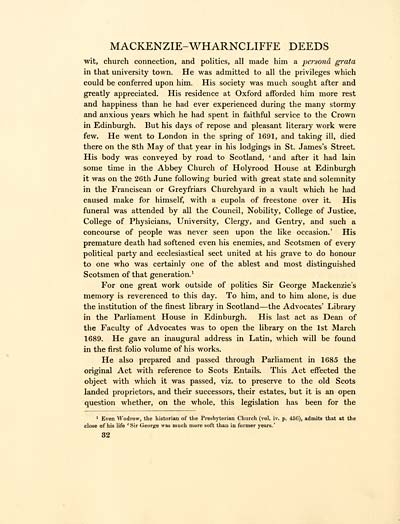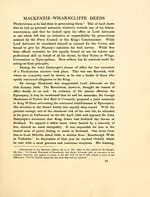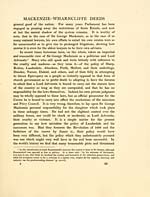Download files
Complete book:
Individual page:
Thumbnail gallery: Grid view | List view

MACKENZIE-WHARNCLIFFE DEEDS
wit, church connection, and politics, all made him a persona grata
in that university town. He was admitted to all the privileges which
could be conferred upon him. His society was much sought after and
greatly appreciated. His residence at Oxford afforded him more rest
and happiness than he had ever experienced during the many stormy
and anxious years which he had spent in faithful service to the Crown
in Edinburgh. But his days of repose and pleasant literary work were
few. He went to London in the spring of 1691, and taking ill, died
there on the 8th May of that year in his lodgings in St. James's Street.
His body was conveyed by road to Scotland, ' and after it had lain
some time in the Abbey Church of Holyrood House at Edinburgh
it was on the 26th June following buried with great state and solemnity
in the Franciscan or Greyfriars Churchyard in a vault which he had
caused make for himself, with a cupola of freestone over it. His
funeral was attended by all the Council, Nobility, College of Justice,
College of Physicians, University, Clergy, and Gentry, and such a
concourse of people was never seen upon the like occasion.' His
premature death had softened even his enemies, and Scotsmen of every
political party and ecclesiastical sect united at his grave to do honour
to one who was certainly one of the ablest and most distinguished
Scotsmen of that generation. 1
For one great work outside of politics Sir George Mackenzie's
memory is reverenced to this day. To him, and to him alone, is due
the institution of the finest library in Scotland — the Advocates' Library
in the Parliament House in Edinburgh. His last act as Dean of
the Faculty of Advocates was to open the library on the 1st March
1689. He gave an inaugural address in Latin, which will be found
in the first folio volume of his works.
He also prepared and passed through Parliament in 1685 the
original Act with reference to Scots Entails. This Act effected the
object with which it was passed, viz. to preserve to the old Scots
landed proprietors, and their successors, their estates, but it is an open
question whether, on the whole, this legislation has been for the
1 Even Wodrow, the historian of the Presbyterian Church (vol. iv. p. 456), admits that at the
close of his life 'Sir George was much more soft than in former years.'
32
wit, church connection, and politics, all made him a persona grata
in that university town. He was admitted to all the privileges which
could be conferred upon him. His society was much sought after and
greatly appreciated. His residence at Oxford afforded him more rest
and happiness than he had ever experienced during the many stormy
and anxious years which he had spent in faithful service to the Crown
in Edinburgh. But his days of repose and pleasant literary work were
few. He went to London in the spring of 1691, and taking ill, died
there on the 8th May of that year in his lodgings in St. James's Street.
His body was conveyed by road to Scotland, ' and after it had lain
some time in the Abbey Church of Holyrood House at Edinburgh
it was on the 26th June following buried with great state and solemnity
in the Franciscan or Greyfriars Churchyard in a vault which he had
caused make for himself, with a cupola of freestone over it. His
funeral was attended by all the Council, Nobility, College of Justice,
College of Physicians, University, Clergy, and Gentry, and such a
concourse of people was never seen upon the like occasion.' His
premature death had softened even his enemies, and Scotsmen of every
political party and ecclesiastical sect united at his grave to do honour
to one who was certainly one of the ablest and most distinguished
Scotsmen of that generation. 1
For one great work outside of politics Sir George Mackenzie's
memory is reverenced to this day. To him, and to him alone, is due
the institution of the finest library in Scotland — the Advocates' Library
in the Parliament House in Edinburgh. His last act as Dean of
the Faculty of Advocates was to open the library on the 1st March
1689. He gave an inaugural address in Latin, which will be found
in the first folio volume of his works.
He also prepared and passed through Parliament in 1685 the
original Act with reference to Scots Entails. This Act effected the
object with which it was passed, viz. to preserve to the old Scots
landed proprietors, and their successors, their estates, but it is an open
question whether, on the whole, this legislation has been for the
1 Even Wodrow, the historian of the Presbyterian Church (vol. iv. p. 456), admits that at the
close of his life 'Sir George was much more soft than in former years.'
32
Set display mode to:
![]() Universal Viewer |
Universal Viewer | ![]() Mirador |
Large image | Transcription
Mirador |
Large image | Transcription
Images and transcriptions on this page, including medium image downloads, may be used under the Creative Commons Attribution 4.0 International Licence unless otherwise stated. ![]()
| Histories of Scottish families > Ancient deeds and other writs in the Mackenzie-Wharncliffe charter-chest > (54) Page 32 |
|---|
| Permanent URL | https://digital.nls.uk/95524013 |
|---|
| Description | A selection of almost 400 printed items relating to the history of Scottish families, mostly dating from the 19th and early 20th centuries. Includes memoirs, genealogies and clan histories, with a few produced by emigrant families. The earliest family history goes back to AD 916. |
|---|

